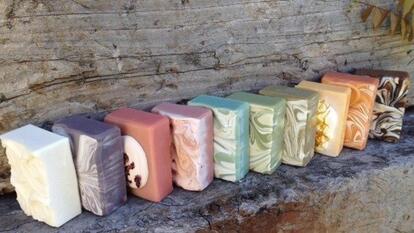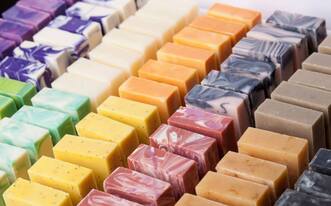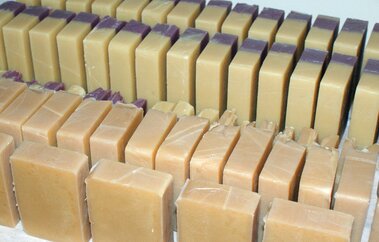Soap History
|
The first concrete evidence we have of soap-like substance is dated around 2800 BC., the first soap makers were Babylonians, Mesopotamians, Egyptians, as well as the ancient Greeks and Romans. All of them made soap by mixing fat, oils and salts. Soap wasn't made and use for bathing and personal hygiene but was rather produced for cleaning cooking utensils or goods or was used for medicine purposes.
|
Soap Facts
Soap is a product for cleaning made from natural ingredients that may include both plant and animal products,
including items as: animal fat, such as tallow or vegetable oil, such as castor, olive, or coconut oil. Soap supposedly
got its name from Mount Sapo in Rome. The word sapo, Latin for soap, first appeared in Pliny the Elder's Historia
Naturalis. The first soap was made by Babylonians around 2800 B.C. The early references to soap making were for
the use of soap in the textile industry and medicinally.
including items as: animal fat, such as tallow or vegetable oil, such as castor, olive, or coconut oil. Soap supposedly
got its name from Mount Sapo in Rome. The word sapo, Latin for soap, first appeared in Pliny the Elder's Historia
Naturalis. The first soap was made by Babylonians around 2800 B.C. The early references to soap making were for
the use of soap in the textile industry and medicinally.
Soap Making
|
Soap making history goes back many thousands of years. The most basic supplies for soap making were those taken from animal and nature; many people made soap by mixing animal fats with lye. Today, soap is produced from fats and an alkali. The cold process method is the most popular soap making process today, while some soap makers use the historical hot process.
|
Cold Process Soap Making
Cold process soap is made by combining oils and sodium hydroxide lye, which causes a chemical reaction called
saponification. In the process, you get to choose the oils, scents, colorants, and any other ingredients. It's a great
way for someone to master the art of soap-making and spa crafts.
saponification. In the process, you get to choose the oils, scents, colorants, and any other ingredients. It's a great
way for someone to master the art of soap-making and spa crafts.
Classes
|
THIS IS FOR NCBA CLUB MEMBERS ONLY: If you are not a club member, please contact Moll's Apothecary directly.
Each class will cover the entire process of cold process soap making. You will actually make your own batch of soap (12 bars) that will be available for pick up several days after the class. Classes will run approximately 3 hours. Classes start at 6:30 pm. Please wear appropriate clothing that you don’t mind getting dirty. You will be dealing with various types of oils, along with lye. Aprons and Goggles will be provided for safety. The classes will be held at Molly’s Apothecary, 163 Main Street, Medway, MA. Class sizes are limited to 10 per class, so sign up quickly. Dates are: Tuesday, March 12 Tuesday, March 19 Thursday, March 28 The cost of class is $85. Classes start at 6:30 PM and are approximately 3 hours long. |
Source: http://www.soaphistory.net/


